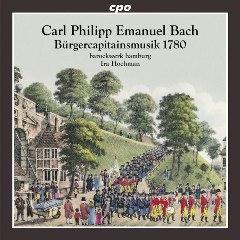C. P. E. Bach - Bürgerkapitänsmusik (Citizens Captain music) [2016]
C. P. E. Bach - Bürgerkapitänsmusik (Citizens Captain music) [2016]

Hebt an, ihr Chöre der Freude, H. 822a: 1. I. Hebt an, ihr Chöre der Freuden 2. II. Heil mir! Ich höre meiner Söhne 3. III. Du Schöpfer meiner Freudenfeste 4. IV. Ich segne dich, Hammona 5. V. Entfleuch in deines Abgrunds Nächte 6. VI. Nein, nein Hammona! Zweifle nicht 7. VII. Wir sollten kalt und hoch vermessen das Mark 8. VIII. Sollt ich meinem Gott nicht singen? 9. IX. Auch mich, o Freundin! 10. X. Hammona bleibet, auch allein 11. XI. Ich seh's, du liebst mich noch 12. XII. Höre von der Wälle Höhn 13. XIII. Du Glückliche! Hier soll mich deine Liebe 14. XIV. Zertrümmerte Städte! Verödete Fluren! 15. XV. Auch unsre Thräne rinnt 16. XVI. Du Gott der Stärke! Hamburgs Gott! Der Trommeln Schlag, der Pfeifen Spiel, H. 822b: 17. I. Der Trommeln Schlag, der Pfeifen Spiel 18. II. Empfanget mich, ihr edlen Patrioten 19. III. Holde Freude! Komm, und kröne 20. IVa. Herein! Was zaudert ihr? 21. IVb. Ja! Fühlen soll sie's 22. V. Ich folge dir; du warst stets mein Getreuer 23. VI. Mein Rasen war, wie einer Sündfluth Rasen 24. VII. Wer seid ihr Kühne! 25. VIII. Kränzt den festlichen Pokal Barockwerk Hamburg Ira Hochman – director
Carl Philipp Emanuel Bach (1714-1788) was the fifth child of great composer Johann Sebastian Bach. He was an important composer in the transitional time between the Baroque and Classical periods. These pieces were composed by CPE Bach for the annual meeting of the Captains of the Hamburg Citizens Guard. Composing for this meeting was an honor, and only the most sought-after composers were commissioned. Each year the commissioned composer would compose an oratorio and a cantata. Here, we have CPE Bach’s Oratorio Hebt an, ihr Chore der Freuden, and his Serenata Der Trommeln Schlag, der Pfeifen Spiel. --- arkivmusic.com
Carl Philipp Emanuel Bach held the most important and influential church musician’s post in Hamburg, with responsibilities comparable to those of his father at the Church of St. Thomas in Leipzig. He wrote his Hamburger Bürgerkapitänsmusik in 1780 for the annual festive gathering of the captains of Hamburg’s civic guard. Trumpets and timpani and allegorical figures including virtues and vices are employed to contrast war and peace. --- europadisc.co.uk
The second surviving son of J.S. Bach, Carl Philipp Emanuel was the most innovative and idiosyncratic member of an extremely talented musical family. His music, unlike that of his father or that of the master he influenced, Haydn, did not define an era so much as reveal a deeply personal response to the musical conventions of his time.C.P.E. Bach could play his father's technically demanding keyboard pieces at sight by the time he was seven. Also an exceptional student in areas other than music, he enrolled at the University of Leipzig in 1731 to study law, then transferred to the University of Frankfurt an der Oder. He graduated in 1734, but remained in that backwater town giving keyboard lessons, involving himself in public concerts, and learning the composer's craft.
By 1740 Bach was in Berlin as harpsichordist to Frederick the Great of Prussia. Here he was first exposed to Italian opera seria, and its dramatic style infiltrated his instrumental music. Little of this was heard at court, where Bach accompanied the flutist-king in one reactionary concerto after another by Quantz. He made several attempts to find a new position, but the stress of the king's disfavor was partially relieved in 1756, when Frederick became distracted by the Seven Years' War and was frequently away from the court. Bach found a select audience for his remarkable and experimental series of keyboard works such as the so-called Prussian and Wurttemberg sonatas (composed in the early 1740s) and the Sonatas with Varied Repeats (1760).
Bach finally got himself released from Frederick's service in 1768 in order to succeed Telemann as cantor at the Johanneum in Hamburg, also serving as music director for the city's five major churches; he held this post until his death.
Stylistically distant from his father's rigorous polyphony, C.P.E. Bach was something of a proto-Romantic; he was the master of Empfindsamkeit, or intimate expressiveness. The dark, dramatic, improvisation-like passages that appear in some of Mozart's and Haydn's works are due in part to his influence; his music in time became known all over Europe. His impulsive works for solo keyboard, which lurch into unexpected keys, change tempo and dynamics abruptly, and fly along with wide-ranging themes, are especially compelling. One account of Bach's after-dinner improvisations described the sweaty, glazed-eyed musician as possessed, an adjective that would be applied to equally intense and idiosyncratic musicians in the Romantic age. Many of his symphonies are as audacious as his keyboard pieces.
In the area of chamber music, Bach pulled the keyboard out of its subsidiary Baroque role and made it a full partner with, or even leader of, the other instruments. Yet here he fashioned the music to the public's conservative expectations, as he did with his church music. He composed prolifically in many genres, and much of his work awaits public rediscovery.
Bach also produced an important account of performance practice in the second half of the eighteenth century, translated into English as Essay on the True Art of Playing Keyboard Instruments. ---James Reel, Rovi
download (mp3 @320 kbs):
yandex 4shared mega mediafire zalivalka cloudmailru uplea








